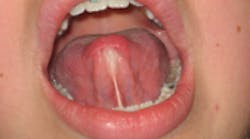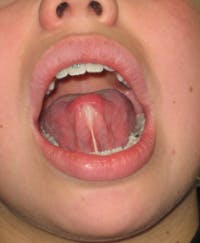By Shirley Gutkowski, RDH, BSDH
Are you of the mindset that if a person can talk and eat they don’t need their tongue-tie released? Read on to lower your tolerance for tongue-tie and improve your patient’s quality of life.
- Bruxing to keep from sleeping deeply
- Restless leg syndrome to keep from sleeping deeply
- Type II diabetes from altered hormones during sleeping with mouth open
- Snoring and behavior problems
- Migraines
- Prognathic profile
- Sensitivity about personal appearance
- Emotional factors resulting in rising levels of stress
Do your patients a favor and lower your tolerance for tongue-tie. There’s more to the tongue than eating and speaking. What’s a tie? It’s not only ankyloglossia! Here are three little tests you can do for every patient and never add a minute to your evaluation time.
- Ask them to stick out their tongue and look for a heart shape on the tip.
- Ask them to open wide and reach with their tongue to the incisive papilla; they can close up to 30% before making a referral.
- Ask them to swallow water with their teeth together and lips apart while they are sitting up. If they can’t or if their tongue pushes forward, refer.
If you get a yes to the first bullet, and/or an over 30% close on the second bullet, and they cannot swallow the water, refer to an orofacial myofunctional therapist. If you want to know more, check out a couple of key websites.
Websites
Shirley Gutkowski, RDH, BSDH, is a practicing dental hygienist specializing in orofacial myofunctional therapy. Her practice, Primal Air, LLC, is in Sun Prairie, Wisconsin. Ms. Gutkowski is also the host of Cross Link Radio, a podcast with timely information integrating oral and systemic health.







